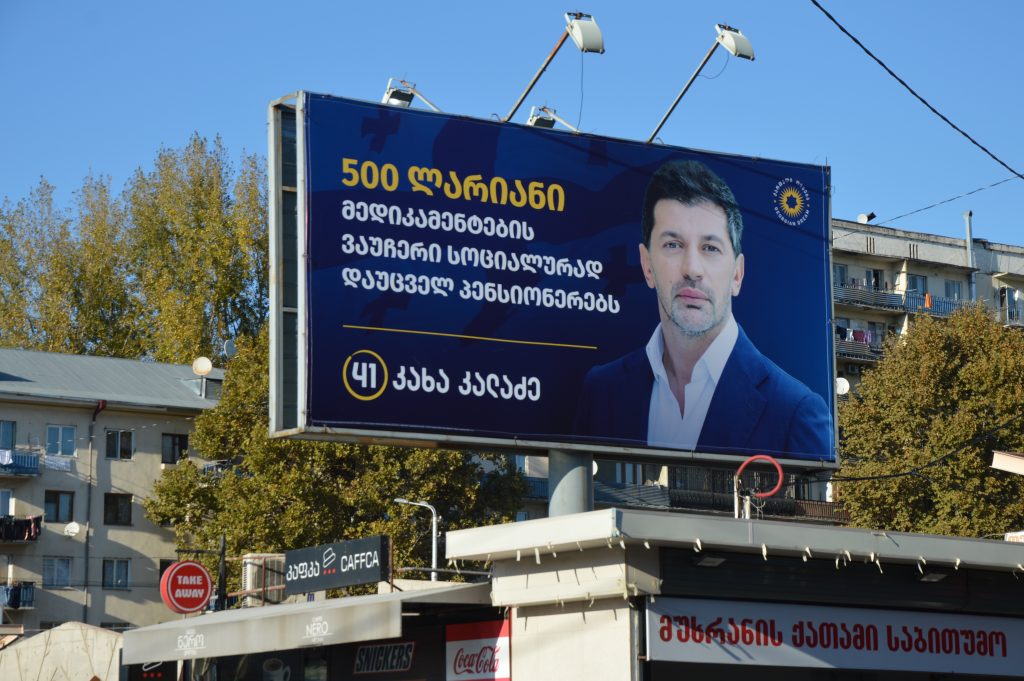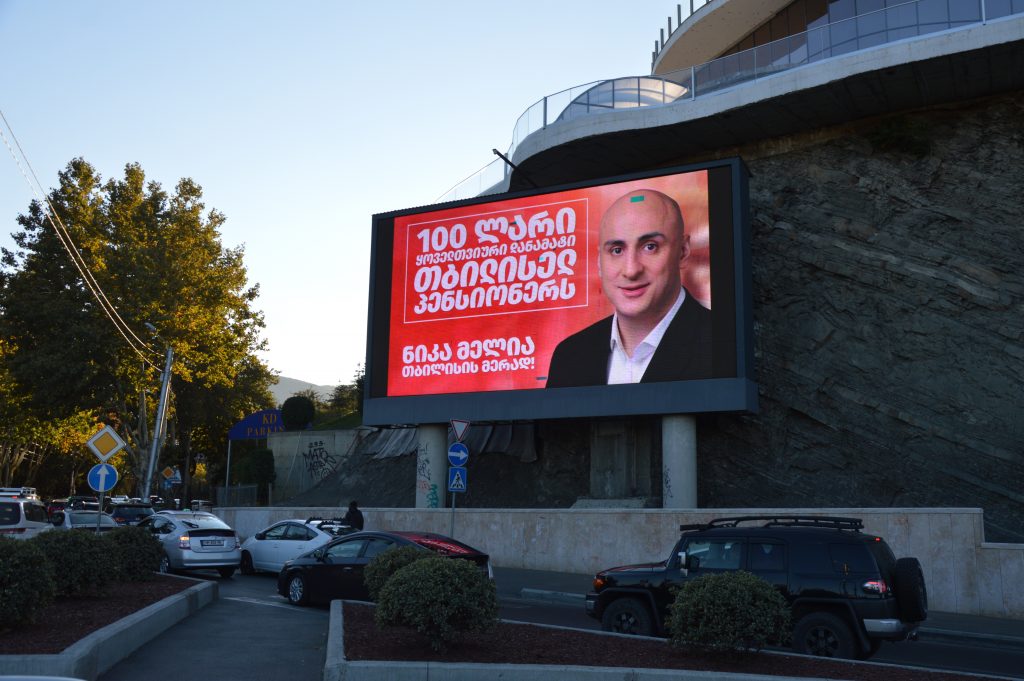Vote, and you’ll regret it; don’t vote, you may also regret it; whoever you vote for, you are likely to regret it either way.
Such is the mood among those who voted for the candidates outside the polarizing prism of bipartisanship in the first round of Georgia’s municipal elections, hoping – apparently, naively and in vain – to end the crescendo of confrontation. The first-round outcomes have cleaned the slate for one more red pill vs blue pill choice: on October 30, locals from all but three out of twenty contested municipalities, including all five self-governing cities, will be casting ballots to tilt the balance in favor of the mayoral candidates hailing either from the Georgian Dream, the party in power, or the United National Movement, its predecessor and archrival.
The three exceptions are Tsageri municipality, where the ruling party hopeful faces the candidate from For Georgia party, led by former Prime Minister Giorgi Gakharia; and Tianeti and Ozurgeti municipalities, where the GD candidates challenge their erstwhile colleagues, which had won mayoral races as independent or with their own minor parties in 2017.
Municipal councils (Sakrebulos) are also contested in some localities. Notably, in Zugdidi, the UNM will have to win the single runoff to regain the one-party majority it lost in a recount. In Tsalenjikha, five majoritarian runoffs will decide the ultimate balance in the councils.
While majoritarian runoffs in Rustavi (1) and Senaki (2) cannot guarantee one-party rule to either of the two major parties, they will still bear much significance amid repeated hints by GD leaders that they will incite individual councilors who ran on other tickets, to switch sides and give the ruling party a comfortable majority.
Local Polls 2021: Electoral Map
Tbilisi, the capital, will be the key symbolic battlefield. With 1,25 million residents, nearly a third of the national population, the change of guard in Tbilisi could break the hold of the Georgian Dream, and revive the hopes of the opposition. It is an uphill struggle: the incumbent GD Mayor, Kakha Kaladze, received 45% of the votes. His challenger from UNM, Nika Melia was trailing with 34%.
But things have evolved since Melia tried to make up for a relatively shallow campaign focusing on a “national referendum” against GD by making specific promises. He also made a bid for “third-way” votes, by unveiling a “shadow coalition government,” which includes other leaders. This may also serve to assuage fears that UNM intends to govern unilaterally. Kaladze, on the other hand, was nudged to walk in the wake of his party leadership’s hate-fuelled campaign against UNM – and Mikheil Saakashvili, who lingers in prison. Whether or not these factors would affect the voter behavior, is anyone’s guess.
Importantly, Giorgi Gakharia (For Georgia) and Anna Dolidze (For People), the two candidates who came behind the two leaders, refused to endorse any of the candidates in the runoff. Their cumulative vote share – 14% – could have been crucial for tilting the balance. The general perception is that the supporters of Gakharia and Dolidze may vote against UNM – if they choose to come out and cast ballots. GD has significantly noted down the first-round vitriol against Gakharia, its estranged leader, hoping for his voters to come back into the fold.
Prime Minister Irakli Garibashvili has implied that should the opposition win municipalities, they will struggle to implement desired projects without the central government’s backing. By warning against unrest and chaos, PM tries to mobilize those voters in provinces who remember Georgia’s turbulent past and may vote for “peace and stability.”

Kakha Kaladze’s runoff ad near Tbilisi’s central Dezerter Bazaar, promising GEL 500 pharmacy voucher to socially vulnerable pensioners. October 2021. Photo: Otar Kobakhidze / Civil.ge 
Nika Melia’s ad near high-rise King David building, promising monthly GEL 100 addition for Tbilisi pensioners. October 2021. Photo: Otar Kobakhidze/Civil.ge
Georgian Dream still had to partly follow the UNM by campaigning on social issues – offering reliefs for medication prices or addressing homelessness in the capital. But these promises took a back seat compared to vows to finally “end UNM” – a message addressed to GD’s hardcore base. The ruling party mocked the “coalition” forged around Melia as a reunion of UNM splinter groups. Indeed Lelo and its leader, Mamuka Khazaradze, are the only unexpected additions.
The major factor believed to be influencing voter behavior in both rounds of the 2021 elections remains the return, arrest and subsequent, ongoing hunger strike of former President Mikheil Saakashvili. His arrival, experts have argued, has already played a role: it may have brought back the polarization, but also boosted the base of UNM, the opposition party with the largest number of loyal supporters, thus rekindling hopes for the opposition in general.
His continued hunger strike has become a ticking bomb, largely due to the repeated and nervous attempts from GD leaders to denigrate the arrested foe, especially linked to the seemingly arbitrary manner in which this particular inmate has been treated. The ruling party officials have repeatedly claimed, for example, that Saakashvili’s hunger strike is “fake” and a “farce,” despite the doctors’ assurances to the contrary.
The scale of the rally held in Tbilisi on October 14, demanding ex-President’s release, seems to have spooked the Georgian dream into mustering the show of electoral force in the streets. On October 27, GD brought together many thousands in what they called a “conclusive” pre-election rally.
Those who voted for either of the two parties on October 2 are expected to do the same now. The rest, again, face difficult moral and rational choices between two forces they dislike, mostly due to their poor track record while in power, penchant for arbitrariness and authoritarianism, human rights flaws, and flirts with illiberal conservatism.
Part of them would rather abstain, for reasons well shown in a famous Witcher Saga quote “if I’m to choose between one evil and another, then I prefer not to choose at all.”
The choice is not going to be easy, but it may well determine Georgia’s trajectory for the years to come. By law, Georgia’s next, parliamentary elections are three years down the road. But as the first round of the local elections has shown, at least half of Georgians who vote, no longer trust the Georgian Dream to deliver.
See Also:

